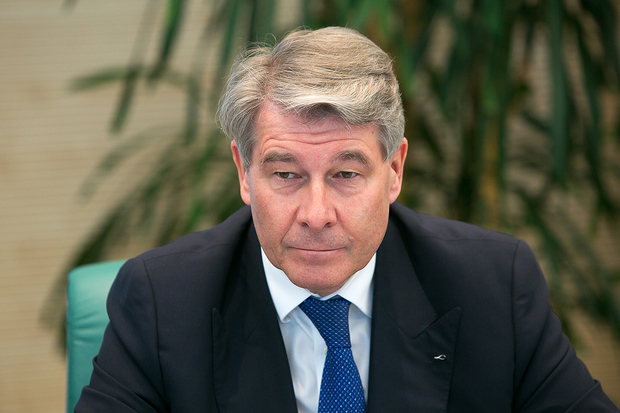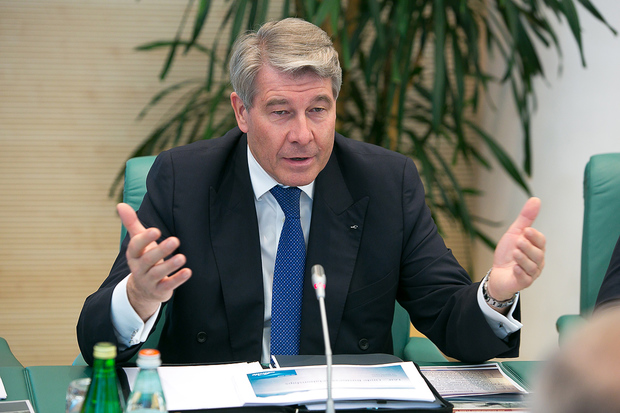Dr Wolfgang Buechele, Linde: ‘Anyone Investing in Russia Should Be Considered a Local Supplier’
The assets of a major German company The Linde Group include more than 350 sites for industrial gas production and large-scale engineering projects all over the world: for Gazprom and Sibur – in Russia, for TAIF Group – in Tatarstan, to name a few. This allows Linde to generate over €4 bn of operating profit. Dr Wolfgang Buechele, Chairman of Germany's Committee on Eastern European Economic Relations and Chief Executive Officer of The Linde Group, arrived in Kazan to discuss further collaboration with the TAIF Group, located in the Republic. Realnoe Vremya newspaper managed to interview the Head of this well-known Company and find out why it was important to support both big and medium-size businesses, what is the impact of sanctions against Russia, and what are the existing key Linde projects in Russia and Tatarstan specifically.
Long-Term Investments in Russia
Dr Buechele, what interests does Linde have in Russia?
Large-scale projects that we take on here, indicate that we are in Russia for the long-term. We believe in Russia, and this is confirmed by our long-term investments.
Exactly what kind of projects do you mean?
Well, firstly, we have several projects already implemented in cooperation with the TAIF Group. There are completed and soon-to-be completed projects that we collaborate on in Tatarstan.
As far as Russia in general is concerned, we plan to launch a hydrogen and ammonia production unit for KuibyshevAzot next year, and KuibyshevAzot, in turn, is going to use hydrogen and ammonia in the manufacturing of its products. We are implementing this project in collaboration with our customer in equal parts (50:50). Potential capacity of this unit for ammonia production is up to 1,340 tons per twenty-four hours, for hydrogen production – up to 120,000 cubic meters per hour.
As early as this year we are going to launch air separation plants for Sibur-Neftekhim. With regards to this project, we have operated and maintained two existing, older air separation plants for Sibur in Dzerzhinsk until the new ones were built and put on-stream. We are also building a pyrolysis plant for Sibur's ZapSibNeftekhim. We plan to complete the work on this project by 2020.
Moreover, late last year, after entering into a strategic cooperation with Gazprom, we received the order for a project to be implemented on the Amur River: to build gas-processing plants in order to fill the pipeline going to China. We will construct helium liquefiers for them as well.
In addition, we not only develop basic designs and build plants for all these projects, but also commit to providing all necessary equipment for their operation and delivering it to the customer.

We believe in Russia, and this is confirmed by our long-term investments.
This practice is common for you, isn't it?
Yes, it is, in addition to Linde Gas Rus being our larger subsidiary through which we supply industrial gas; we also carry out large-scale Engineering development and construction projects in Russia.
Do you hold any further discussions with other Tatarstan companies?
We have collaborated and had discussions with TAIF in Tatarstan and Nizhnekamskneftekhim, one of the members of the TAIF Group.
You introduce α-SABLIN® technology for Nizhnekamskneftekhim. Where else is it applied in Russia or throughout the world?
In Saudi Arabia in a pilot scale operation.
And what about your hydrogen plant included in the engineering process of the Heavy Residues Advanced Refining Unit of TAIF-NK, what producing units in Russia or throughout the world operate such plants?
There is no exact same plant anywhere. A similar plant, however, is being built for KuibyshevAzot in Togliatti as part of our joint venture.
6 thousand German companies invest in Russia
Dr Buechele, at the end of last year, you became the Chairman of Germany's Committee on Eastern European Economic Relations. That time you said that the most important and crucial task for the Committee was to back partnership with Russia. What is needed for this and what does implementation look like?
Firstly, I believe that Russia and Germany have historically had a very close and positive relationship. About 6,000 German companies have invested and continue to invest in Russia. Addressing the legal framework of medium-sized businesses in Russia is among the important tasks for the future. Big companies tend to always settle their issues, even if something goes wrong; it is more difficult for small and medium-sized companies. Another thing is also important: any company investing in Russia should be considered a local supplier. Today we still have heated discussions, and so far, we face obstacles, but make every effort to overcome these difficulties.
We fully support the idea of local manufacturing in as many industries as possible, however, I believe it is important to discuss the areas for which it makes sense and for which it is unreasonable.
Exactly for what projects was the German-Russian business platform set up last year, for the purpose of which, in particular,Germany's Committee on Eastern European Economic Relations and the Russian Union of Industrialists and Entrepreneurs united?
In my opinion, the main purpose of the platform is not to implement any specific projects, but to open a dialogue. The main thing was to resume the first round of formal discussions, as the official ones had stopped with the introduction of sanctions. Another important platform is the St. Petersburg Dialogue, which has also been resumed. (Editor's Note: Petersburg Dialogue, a Russian-German Public Forum, was established in 2001 at the initiative of the Russian President Vladimir Putin and the former German Chancellor Gerhard Schroeder) I hope that the scheduled event is still held in June. These are our short-term plans. As for medium-term plans, I think that they will work out fine. The main thing is to resume collaboration. We fully support the idea of local manufacturing in as many industries as possible, however, I believe it is important to discuss the areas for which it makes sense and for which it is unreasonable. This discussion is currently going on, and I regularly meet with various Russian politicians in my new Eastern Committee Chairman capacity.
For which areas do you think the localization of industries would be the right decision?
For example, speaking of Linde: within the framework of the Power of Siberia project, we have agreed with Gazprom that we will provide part of the key arctic technology and equipment in order to ensure the opportunity to replicate this technology in Russia. Certainly, there is other technology and equipment that may be bought anywhere, and it makes no sense to develop everything in Russia.
Another point, which I have mentioned before: if a foreign company produces anything in Russia, it should be considered one of the local Russian suppliers. This status should also be recognized in the course of public tenders, as a matter of example, and in other relevant situations. Surely, in this context, there are still a lot of points that require clarification.
Personally, it is important for me that neither of the countries exerts any pressure, that there is a real dialogue between Russia and Germany. Businessmen of the two countries regularly sit down for talks. I am convinced that we will see progress already this year.

Personally, it is important for me that neither of the countries exerts any pressure, that there is a real dialogue between Russia and Germany. Businessmen of the two countries regularly sit down for talks. I am convinced that we will see progress already this year.
The prospects are good then, aren't they?
The prospects are really good. Although we have not discussed, for example, issues related to sanctions during the meetings with our partner enterprises of the TAIF Group, I believe that the range of possibilities where we may avoid sanctions expands. On the other hand, there are many different interests, and it is always necessary to balance them.
Reference
Linde company, established in 1878, consists of three divisions: Linde Gases and Linde Engineering (two core divisions) and other activities (logistics company Gist). The largest division, Gases, has three segments: EMEA (Europe,Middle East and Africa), Asia/Pacific and the Americas. These segments are further subdivided into nine Regional Business Units (RBUs). In addition, Linde has established five Global Governance Centres (GGCs) for the Gases Division which are centrally managed and operate across the regions: GGC Merchant & Packaged Gases (liquefied gases and cylinder gas), GGC Electronics (electronic gases), GGC Healthcare, GGC Operations and GGC Deliver. The Group has also set up the Group-wide function Opportunity & Project Development in order to take better advantage of business opportunities.
Operating profit of the Linde group in 2015 amounted to 4.1 billion euros. Sales of regional divisions in 2015: Europe and the Middle East — 6.077 billion euros, the Asia-Pacific region – 4.162 billion euros, America – 5.183 billion euros.
The Linde group has a leading position in developing technologies with the possibility of implementing EPC projects. It gives an advantage over the other gas companies. Engineering developments with ownership right and own experience of operation of Linde are used for the design of reliable systems. Symbiosis in both directions: Linde Gases is the biggest customer of Linde Engineering.
Dr Wolfgang Buechele was born in 1959 in Geislingen, Germany. Since last year Dr Buechele heads the Eastern Committee of German economy, which is the collective body of a number of key associations of business unions in Germany: the Federation of German Industry (BDI), the Association of German Banks (BdB), the German Insurance Association (GDV), the Foreign Trade Association of German Retail Trade (AVE), the German Confederation of Skilled Crafts (ZDH). Since 2014 he is the CEO of Linde AG in Munich. From 2012 to 2014 he was the President and CEO of Kemira Oyj, Helsinki, Finland. From 2009 to 2011, he was a member of the Board and the CEO of BorsodChem Zrt., Budapest, Hungary. In 2008, he was a Project Advisor to the Blackstone Group International Partners LLP, London, UK. From 1987 to 2007 he worked at the largest chemical concern BASF AG, Ludwigshafen.